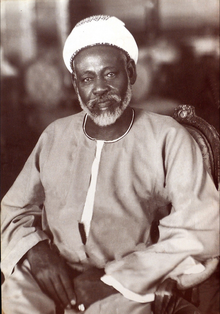
Back عبد الرحمن المهدي Arabic Sayyid Abd al-Rahman ibn al-Mahdi Catalan Abd al-Rahman al-Mahdi German عبدالرحمن المهدی Persian Sayid Abdel Rahman al-Mahdi French 아브드 알라흐만 알마흐디 Korean عبدالرحمن المهدي Pashto/Pushto Abd-el-Rahman el-Mahdi Swedish
Abd al-Rahman al-Mahdi | |
|---|---|
عبد الرحمن المهدي | |
 Al-Mahdi in 1958 | |
| Imam of the Ansar | |
| In office June 1885 – 24 March 1959 | |
| Preceded by | Muhammad Ahmad |
| Succeeded by | Hadi al-Mahdi |
| 1st Chief Minister of Sudan | |
| In office 22 October 1952 – November 1953 | |
| Preceded by | Position established |
| Succeeded by | Ismail al-Azhari |
| Personal details | |
| Born | June 1885 Omdurman, Mahdist Sudan |
| Died | 24 March 1959 (aged 73) Omdurman, Sudan |
| Children | Siddick Sayed el-Mahdi Hadi al-Mahdi |
| Parent | Muhammad Ahmad |
Sir Sayyid Abd al-Rahman al-Mahdi, KBE (Arabic: عبد الرحمن المهدي; June 1885 – 24 March 1959[1]) was one of the leading religious and political figures during the colonial era in Anglo-Egyptian Sudan (1898–1955), and continued to exert great authority as leader of the Neo-Mahdists after Sudan became independent. The British tried to exploit his influence over the Sudanese people while at the same time profoundly distrusting his motives. Throughout most of the colonial era of Anglo-Egyptian Sudan, the British saw Sayyid Abd al-Rahman al-Mahdi as important as a moderate leader of the Mahdists.[2]
Abd al-Rahman was the posthumous son of Muhammad Ahmad bin Abd Allah, who had proclaimed himself the Mahdi or redeemer of the Islamic faith in 1881, and died in 1885 a few months after his forces had captured Khartoum. A joint British and Egyptian force recaptured Sudan in 1898. At first, the British severely restricted Abd al-Rahman's movement and activity. However, he soon emerged as the Imam (leader) of the Ansar religious sect, supporters of the Mahdist movement.[2]
The British maintained a close political relationship with Abd al-Rahman.[3] Meanwhile, he grew wealthy from cotton production, for which his supporters provided labour since he was a child exiled to Aba Island, and was influential and well loved among his people.[4] The British administration distrusted him because they could not control him or use him to exert influence in Sudan.
In the 1930s, Abd al-Rahman spoke out against a treaty between Egypt and Britain that recognized Egyptian claims of sovereignty in Sudan, although no Sudanese had been consulted. He travelled to London to make his case.[5] His Ansar followers became an influential faction in the General Congress established in 1938, and in the successor Advisory Council set up in 1944.[6][7] Abd al-Rahman was patron of the nationalist Umma (Nation) political party in the period before and just after Sudan became independent in 1956.[8] In 1958 the Umma party won the most seats in the first parliamentary elections after independence.[9] In November 1958 the army staged a coup, which Abd al-Rahman supported. He died on 24 March 1959, aged 73.[10]
- ^ Rulers: IM-M.
- ^ a b Stiansen & Kevane 1998, pp. 23–27.
- ^ Warburg 2003, pp. 76–77.
- ^ Bartlett 2008, p. 73.
- ^ Warburg 2003, pp. 106–107.
- ^ Warburg 2003, p. 121.
- ^ Warburg 2003, p. 115.
- ^ Warburg 2003, pp. 125–127.
- ^ Brief History.
- ^ Niblock 1987, pp. 219–220.
© MMXXIII Rich X Search. We shall prevail. All rights reserved. Rich X Search